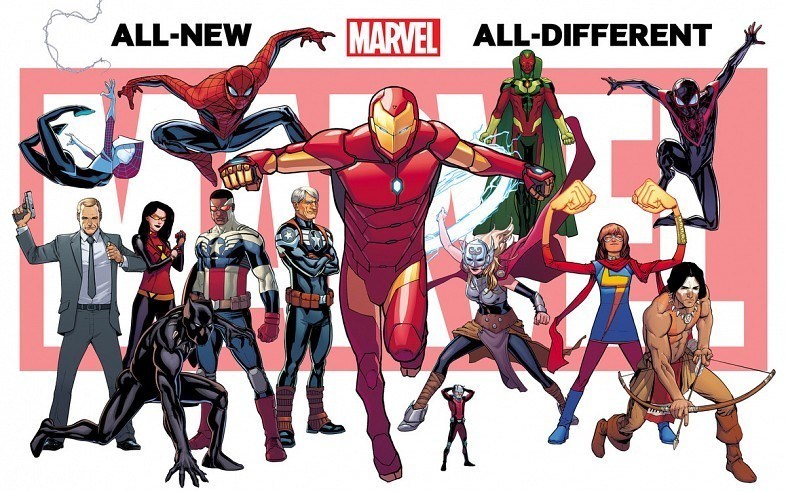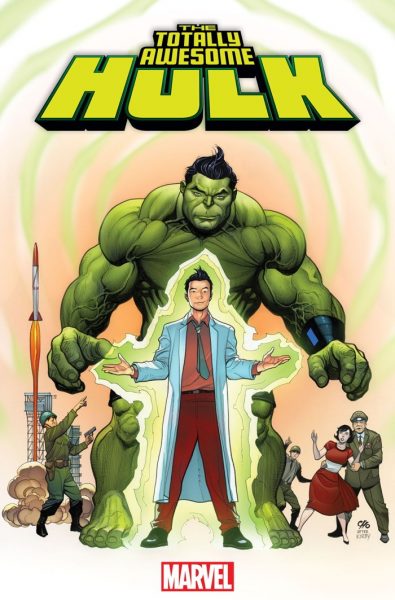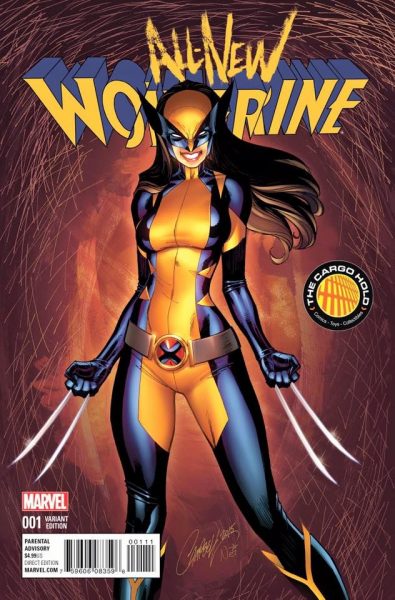Will Legacy Characters Work for Marvel Comics?
It would be fair to say that DC Comics first cornered the market on legacy characters, superheroes whose identity and look changes from generation to generation. For most of their history, however, Marvel Comics has had a very different approach to their characters. They offered unchanging icons, with one secret identity. Lately, though, Marvel has put a lot of effort into developing new generations of their well-known heroes. Will this strategy pay off in the long run or is it a temporary variation from the tried and true characters?

Legacy character was originally DC’s solution (an ingenious one, really) of how to integrate their Golden Age characters with the rebirth of superhero comics in the Silver Age, in the early 1960s. While Superman and Batman continued the entire time, DC offered a
new version of the Flash (Barry Allen), Green Lantern (Hal Jordan), the Atom (Ray Palmer) and many others in the Silver Age. This became a house policy as DC often revitalized characters, especially second and third-tier characters, by having a new person assume the name and mantle of the character. Starman became Star Girl, Johnny Thunder became Jakeem Thunder, and Shiera Hall became Kendra Saunders (among many others).
On the other hand, most of the iconic heroes of Marvel Comics have had one identity. There have been some exceptions, but Captain America has usually been Steve Rogers, Hulk has been Bruce Banner, Spider-Man has been Peter Parker, and Iron Man has been Tony Stark. There have been a few legacy characters like Captain Marvel, but generally characters that changed identities were villains. Marvel didn’t have as many characters to import from the Golden Age, and decided to stay with their original identities. So they have had a quite different approach to DC’s emphasis on evolution of superheroes.

Lately, though, Marvel has introduced many different versions of well-established characters. The Hulk is now Amadeus Cho, Captain America is Sam Wilson (and Steve Rogers), Spider-Man is Miles Morales (and Peter Parker), and Thor is Jane Foster. Additionally, Marvel has brought in new versions of Ms. Marvel, Wasp, Nick Fury, Spider-Woman and Wolverine over the past few years. Most of them were part of the Marvel NOW! or All-New, All-Different Marvel platform. So why, after 75 years as a publisher and over 50 years for many of these characters, has Marvel now decided to push legacy characters so much?
There is not one obvious answer as to why Marvel has introduced so many new versions of their longtime heroes. One element is that it has gotten harder and harder to sell comics, so Marvel feels like they have to try new things. On a related note, there are different types of readers paying attention to Marvel than in the past. So Marvel is giving those readers, many of them women and minorities, more female and ethnically-diverse superheroes. Another reason is that as Marvel’s movie and TV presence gets more pervasive, it is smart to create new characters who can one day take a place in those worlds, especially as original actors out-age their roles. Similarly, the success of Marvel’s movies makes additional intellectual properties a potential financial asset.

The question is whether audiences will want multiple generations of Marvel heroes. Some of the new versions, such as Miles Morales and the female Thor, have proven to be big hits and may last for quite some time. The tricky part is whether Marvel will want to retire the original versions of the legacy characters. It’s hard to see Marvel fans wanting Steve Rogers, Tony Stark or Peter Parker to permanently retire. Having multiple versions of many characters has worked for DC, but it could get confusing for Marvel to suddenly have so many characters with the same name. Marvel could also run the risk of pushing too many new versions of old characters too quickly, making readers feel like the heroes are being shoved down their throats.
It’s unlikely that Marvel will retreat entirely from their initiative of highlighting legacy characters. They may eventually retract some of the less successful ones. There may also come a day when we see a third generation of heroes, which has occurred with some DC heroes. What do you think about these legacy characters? Are they as compelling as the originals? Which are your favorites?
 Legacy character was originally DC’s solution (an ingenious one, really) of how to integrate their Golden Age characters with the rebirth of superhero comics in the Silver Age, in the early 1960s. While Superman and Batman continued the entire time, DC offered a new version of the Flash (Barry Allen), Green Lantern (Hal Jordan), the Atom (Ray Palmer) and many others in the Silver Age. This became a house policy as DC often revitalized characters, especially second and third-tier characters, by having a new person assume the name and mantle of the character. Starman became Star Girl, Johnny Thunder became Jakeem Thunder, and Shiera Hall became Kendra Saunders (among many others).
On the other hand, most of the iconic heroes of Marvel Comics have had one identity. There have been some exceptions, but Captain America has usually been Steve Rogers, Hulk has been Bruce Banner, Spider-Man has been Peter Parker, and Iron Man has been Tony Stark. There have been a few legacy characters like Captain Marvel, but generally characters that changed identities were villains. Marvel didn’t have as many characters to import from the Golden Age, and decided to stay with their original identities. So they have had a quite different approach to DC’s emphasis on evolution of superheroes.
Legacy character was originally DC’s solution (an ingenious one, really) of how to integrate their Golden Age characters with the rebirth of superhero comics in the Silver Age, in the early 1960s. While Superman and Batman continued the entire time, DC offered a new version of the Flash (Barry Allen), Green Lantern (Hal Jordan), the Atom (Ray Palmer) and many others in the Silver Age. This became a house policy as DC often revitalized characters, especially second and third-tier characters, by having a new person assume the name and mantle of the character. Starman became Star Girl, Johnny Thunder became Jakeem Thunder, and Shiera Hall became Kendra Saunders (among many others).
On the other hand, most of the iconic heroes of Marvel Comics have had one identity. There have been some exceptions, but Captain America has usually been Steve Rogers, Hulk has been Bruce Banner, Spider-Man has been Peter Parker, and Iron Man has been Tony Stark. There have been a few legacy characters like Captain Marvel, but generally characters that changed identities were villains. Marvel didn’t have as many characters to import from the Golden Age, and decided to stay with their original identities. So they have had a quite different approach to DC’s emphasis on evolution of superheroes.
 Lately, though, Marvel has introduced many different versions of well-established characters. The Hulk is now Amadeus Cho, Captain America is Sam Wilson (and Steve Rogers), Spider-Man is Miles Morales (and Peter Parker), and Thor is Jane Foster. Additionally, Marvel has brought in new versions of Ms. Marvel, Wasp, Nick Fury, Spider-Woman and Wolverine over the past few years. Most of them were part of the Marvel NOW! or All-New, All-Different Marvel platform. So why, after 75 years as a publisher and over 50 years for many of these characters, has Marvel now decided to push legacy characters so much?
There is not one obvious answer as to why Marvel has introduced so many new versions of their longtime heroes. One element is that it has gotten harder and harder to sell comics, so Marvel feels like they have to try new things. On a related note, there are different types of readers paying attention to Marvel than in the past. So Marvel is giving those readers, many of them women and minorities, more female and ethnically-diverse superheroes. Another reason is that as Marvel’s movie and TV presence gets more pervasive, it is smart to create new characters who can one day take a place in those worlds, especially as original actors out-age their roles. Similarly, the success of Marvel’s movies makes additional intellectual properties a potential financial asset.
Lately, though, Marvel has introduced many different versions of well-established characters. The Hulk is now Amadeus Cho, Captain America is Sam Wilson (and Steve Rogers), Spider-Man is Miles Morales (and Peter Parker), and Thor is Jane Foster. Additionally, Marvel has brought in new versions of Ms. Marvel, Wasp, Nick Fury, Spider-Woman and Wolverine over the past few years. Most of them were part of the Marvel NOW! or All-New, All-Different Marvel platform. So why, after 75 years as a publisher and over 50 years for many of these characters, has Marvel now decided to push legacy characters so much?
There is not one obvious answer as to why Marvel has introduced so many new versions of their longtime heroes. One element is that it has gotten harder and harder to sell comics, so Marvel feels like they have to try new things. On a related note, there are different types of readers paying attention to Marvel than in the past. So Marvel is giving those readers, many of them women and minorities, more female and ethnically-diverse superheroes. Another reason is that as Marvel’s movie and TV presence gets more pervasive, it is smart to create new characters who can one day take a place in those worlds, especially as original actors out-age their roles. Similarly, the success of Marvel’s movies makes additional intellectual properties a potential financial asset.
 The question is whether audiences will want multiple generations of Marvel heroes. Some of the new versions, such as Miles Morales and the female Thor, have proven to be big hits and may last for quite some time. The tricky part is whether Marvel will want to retire the original versions of the legacy characters. It’s hard to see Marvel fans wanting Steve Rogers, Tony Stark or Peter Parker to permanently retire. Having multiple versions of many characters has worked for DC, but it could get confusing for Marvel to suddenly have so many characters with the same name. Marvel could also run the risk of pushing too many new versions of old characters too quickly, making readers feel like the heroes are being shoved down their throats.
It’s unlikely that Marvel will retreat entirely from their initiative of highlighting legacy characters. They may eventually retract some of the less successful ones. There may also come a day when we see a third generation of heroes, which has occurred with some DC heroes. What do you think about these legacy characters? Are they as compelling as the originals? Which are your favorites?
The question is whether audiences will want multiple generations of Marvel heroes. Some of the new versions, such as Miles Morales and the female Thor, have proven to be big hits and may last for quite some time. The tricky part is whether Marvel will want to retire the original versions of the legacy characters. It’s hard to see Marvel fans wanting Steve Rogers, Tony Stark or Peter Parker to permanently retire. Having multiple versions of many characters has worked for DC, but it could get confusing for Marvel to suddenly have so many characters with the same name. Marvel could also run the risk of pushing too many new versions of old characters too quickly, making readers feel like the heroes are being shoved down their throats.
It’s unlikely that Marvel will retreat entirely from their initiative of highlighting legacy characters. They may eventually retract some of the less successful ones. There may also come a day when we see a third generation of heroes, which has occurred with some DC heroes. What do you think about these legacy characters? Are they as compelling as the originals? Which are your favorites?